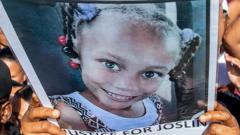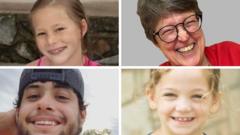The tragic story of Joshlin Smith, who vanished at age six, reflects broader crises in South Africa’s societal structure and the dynamics of family and poverty.
**Heartbreaking Case of Missing South African Girl Reveals Deep Social Issues**

**Heartbreaking Case of Missing South African Girl Reveals Deep Social Issues**
A mother convicted of selling her daughter leaves a courtroom in tears, highlighting a nation’s anguish over child trafficking.
In a heartrending courtroom scene in Saldanha Bay, South Africa, emotions ran high as a video of the missing six-year-old, Joshlin Smith, laughing was played just before her mother's sentencing. Racquel Smith, charged with the kidnapping and trafficking of her daughter, along with her associates, was found guilty after it was alleged she sold Joshlin for financial gain.
The courtroom visibly reacted as victim statements were translated; Amanda Smith-Daniels, Joshlin’s grandmother, expressed despair, stating, “How do you sleep [and] live with yourself?” Testimonies revealed chilling details about the circumstances leading to Joshlin's disappearance, with one witness asserting that her mother had planned to sell her to a traditional healer for her physical features.
The investigation uncovers the struggles of Joshlin’s family, living in an informal settlement, plagued by poverty and drug addiction. Reports disclosed that Smith had a history of substance abuse, having lived under a cloud of neglect that affected her children as well. A poignant picture of Joshlin's life emerged during the trial, with her teachers and caregivers sharing their grief over her fate.
Prosecutor Bianca van Aswegen remarked on the national significance of Joshlin's case, comparing it to other high-profile disappearances globally. Although the conviction provided some closure, the haunting question remains: what happened to Joshlin Smith?
As the public continues to grapple with this heartbreaking incident, it has ignited conversations around child trafficking and systemic familial crises within South Africa. As of last year alone, nearly 633 children were reported missing, revealing a growing epidemic that remains hidden beneath the surface.
This tragic case of Joshlin Smith, a symbol of innocence lost, serves as a call to action for citizens and authorities alike to address and combat the dire practices threatening vulnerable children in civil society.
The courtroom visibly reacted as victim statements were translated; Amanda Smith-Daniels, Joshlin’s grandmother, expressed despair, stating, “How do you sleep [and] live with yourself?” Testimonies revealed chilling details about the circumstances leading to Joshlin's disappearance, with one witness asserting that her mother had planned to sell her to a traditional healer for her physical features.
The investigation uncovers the struggles of Joshlin’s family, living in an informal settlement, plagued by poverty and drug addiction. Reports disclosed that Smith had a history of substance abuse, having lived under a cloud of neglect that affected her children as well. A poignant picture of Joshlin's life emerged during the trial, with her teachers and caregivers sharing their grief over her fate.
Prosecutor Bianca van Aswegen remarked on the national significance of Joshlin's case, comparing it to other high-profile disappearances globally. Although the conviction provided some closure, the haunting question remains: what happened to Joshlin Smith?
As the public continues to grapple with this heartbreaking incident, it has ignited conversations around child trafficking and systemic familial crises within South Africa. As of last year alone, nearly 633 children were reported missing, revealing a growing epidemic that remains hidden beneath the surface.
This tragic case of Joshlin Smith, a symbol of innocence lost, serves as a call to action for citizens and authorities alike to address and combat the dire practices threatening vulnerable children in civil society.




















